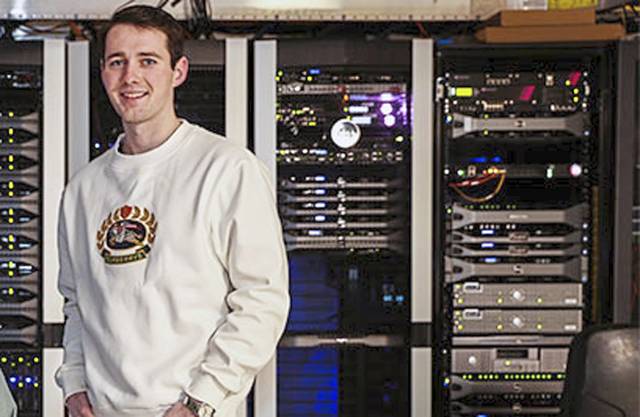Murrysville man joins supercomputing research team at Berkeley lab
So far, the Lawrence Berkeley National Laboratory in Berkeley, Calif., has been home to 13 Nobel Prizes, and hosted the discovery of 16 elements on the periodic table as well as more than 600 isotopes.
Late last year, and two more times in 2019, it will be home — albeit temporarily — to Alex Gessinger, 21, of Murrysville, who along with two fellow students and faculty mentor Nitin Sukhija became a temporary hire at the lab, helping scientists around the world discover better, more efficient ways to use supercomputers.
“The caliber of work that’s done at Berkeley was an exciting opportunity to work with a lot of the other brilliant people in that lab,” said Gessinger, a 2015 Franklin Regional graduate. “It also builds my credibility to have worked out there.”
“They are getting exposed to brilliant minds and the best researchers in the world,” said Sukhija, who is also director of Slippery Rock’s Center for Cybersecurity and Advanced Computing, known as C2AC. “This experience is hard to get, even for a Ph.D. student. Everyone’s talking research there and trying to solve problems and they get to be part of that.”
The SRU research team will collaborate on a new project, “Data Analytics for Extreme-Scale Scientific Computing.”
The researchers are analyzing high-performance computers by taking large datasets used in the Berkeley Lab to predict and prescribe ways to optimize data processing.
“We’re working with petabytes of data,” Gessinger said. A petabyte is 1 million gigabytes.
Gessinger and his team are making information available so that other data scientists can more easily perform actions in optimal conditions to conserve time and energy, based on parameters such as the temperature in a lab’s server racks, and in ways that more easily detect malicious activity if data is compromised.
Few people have access to such large datasets to run these simulations, but Gessinger is no stranger to them. He previously conducted research at the Oak Ridge National Laboratory in Tennessee, optimizing the use of big data systems.
“The research I did at Oak Ridge isn’t directly related, but working with those systems is something that will carry over to this project,” Gessinger said.
The Berkeley Lab is home to the country’s second-most powerful supercomputer, with 1.05 quadrillion calculations per second; the U.S. Department of Energy’s most scientifically productive supercomputing center, with more than 4,000 users from laboratories and universities logging on to the systems across the country; and more than 3 billion computational hours per year.
Scientists from around the world rely on the Berkeley Lab’s facilities for their own discovery science, and one of the founding concepts of the lab is the belief that scientific research is best done through teams of individuals with different fields of expertise, working together.
SRU’s three students reflect this approach.
Gessinger has a background of scheduling jobs run by high-performance computers, or HPCs. Sonny Sevin, a senior computing major from Grove City, works with cybersecurity and data visualization, creating portals so that researchers and end users can identify datasets and make decisions. John-George Sample, a senior computing major from Corry, has experience using blockchain technology, which improves cybersecurity by making attacks easily detectible through a distributed ledger and that requires hackers to conduct massive computing efforts in order to modify data.
“(Lawrence Berkeley National Laboratory) wants to create a way to easily distribute this data to the public but also maintain some control over it,” Sample said. “They want a system where a user can request data and the lab approves it and sends it back to them. We’ll be using Blockchain-based access control, which is a relatively new concept.”
“The benefits of the research are three-fold,” said Sukhija said, mentioning visualization, cybersecurity and efficiency of the HPCs. “That’s why I took the team: because they have different talents. They can work on different aspects and learn from each other and the different technology.”
The team hopes to publish the results of their research, so Gessinger did not want to delve into specifics, but said he is excited to get back to the lab.
“It’s exciting just to be near all the activity that’s going on in the Silicon Valley and learn at such a prestigious lab,” said Gessinger, who plans to pursue a master’s degree in data science following his time at Berkeley. “It’s almost overwhelming.”
Patrick Varine is a TribLive reporter covering Delmont, Export and Murrysville. He is a Western Pennsylvania native and joined the Trib in 2010 after working as a reporter and editor with the former Dover Post Co. in Delaware. He can be reached at pvarine@triblive.com.
Remove the ads from your TribLIVE reading experience but still support the journalists who create the content with TribLIVE Ad-Free.


